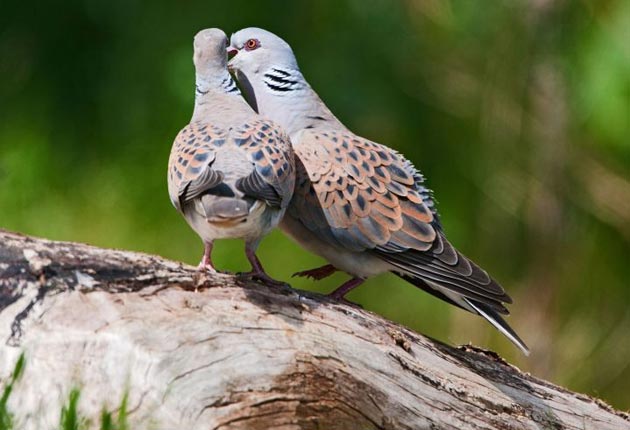Why an ancient symbol of love is heading for an unhappy ending
The turtle dove has vanished from half its nesting sites in the past 20 years

Sad news for lovers and happy couples full of a warm feeling from the royal wedding – the turtle dove, the ancient symbol of true love and fidelity, has disappeared from nearly half its nesting sites in Britain in the past 20 years.
The headlong decline of the bird, seen as an icon of romantic affection since the Middle Ages, is revealed in unpublished data for the new edition of The Atlas of Breeding Birds in Britain and Ireland, due to be published in two years' time.
Intensive surveys have shown that turtle doves have disappeared from 40 per cent of the map grid squares where they were found during the fieldwork for the last atlas, which covered the three-year period from 1988 to 1991. The birds have virtually vanished from the West Country, Wales, the North and the Midlands, and are increasingly confined to the south-east corner of England, with strongholds in the East Anglian counties and Kent, said Dawn Balmer of the British Trust for Ornithology (BTO), who is coordinating the atlas project.
"I think people will be very sad about this, because they are such beautiful birds with really stunning plumage, and the sound they make is a really distinctive summer sound," Ms Balmer said.
In fact, the dreamy purr of turtle doves has been celebrated for at least three thousand years. It was written about in one of the loveliest books of the Bible, The Song of Solomon, where the anonymous Hebrew poet proclaims: "For, lo, the winter is past, the rain is over and gone; the flowers appear on the earth; the time of the singing of birds is come, and the voice of the turtle is heard in our land." (The "turtle" being the bird).
In more recent centuries, the turtle dove was seen as a symbol of true love. Chaucer gives a speech on the subject in "The Parliament of Fowls" and the dove is frequently referred to as an emblem of fidelity by Shakespeare, and many subsequent authors.
The shrinkage of the bird's distribution, or range, revealed by the new atlas data, is actually exceeded by the rapid decline in its numbers. Latest figures from the BTO's Breeding Bird survey show that between 1995 and 2008, Streptopelia turtur fell in numbers by 70 per cent.
No one knows the reason for the decline. One factor is thought to be the intensification of farming, and the disappearance of the weeds of the crop fields, in particular fumitory, on which the birds once fed.
The turtle dove, like a number of other declining British birds, such as the spotted flycatcher and the wood warbler, is a summer visitor from Africa, and it may be that conditions on its wintering grounds are having an adverse effect.
However, it seems likely that hunting pressure during its annual migrations to and from Europe may be a much more important factor.
Hunters in France, and especially in Mediterranean islands such as Cyprus and Malta, may be having a real effect on the population.
Earlier in the week, BirdLife, the international partnership of bird protection organisations, alleged that spring hunting of birds in Malta was "out of control" and called for the hunting season to be immediately suspended to prevent more protected birds from being killed and injured.
In a highly contested move that caused concerns across Europe, the Maltese government has allowed the shooting of a limited number of turtle doves and common quail in the last fortnight, using a get-out clause in the EU Birds Directive.
But this open season has been used as a cover for a large amount of illegal shooting, BirdLife said.
Subscribe to Independent Premium to bookmark this article
Want to bookmark your favourite articles and stories to read or reference later? Start your Independent Premium subscription today.

Join our commenting forum
Join thought-provoking conversations, follow other Independent readers and see their replies